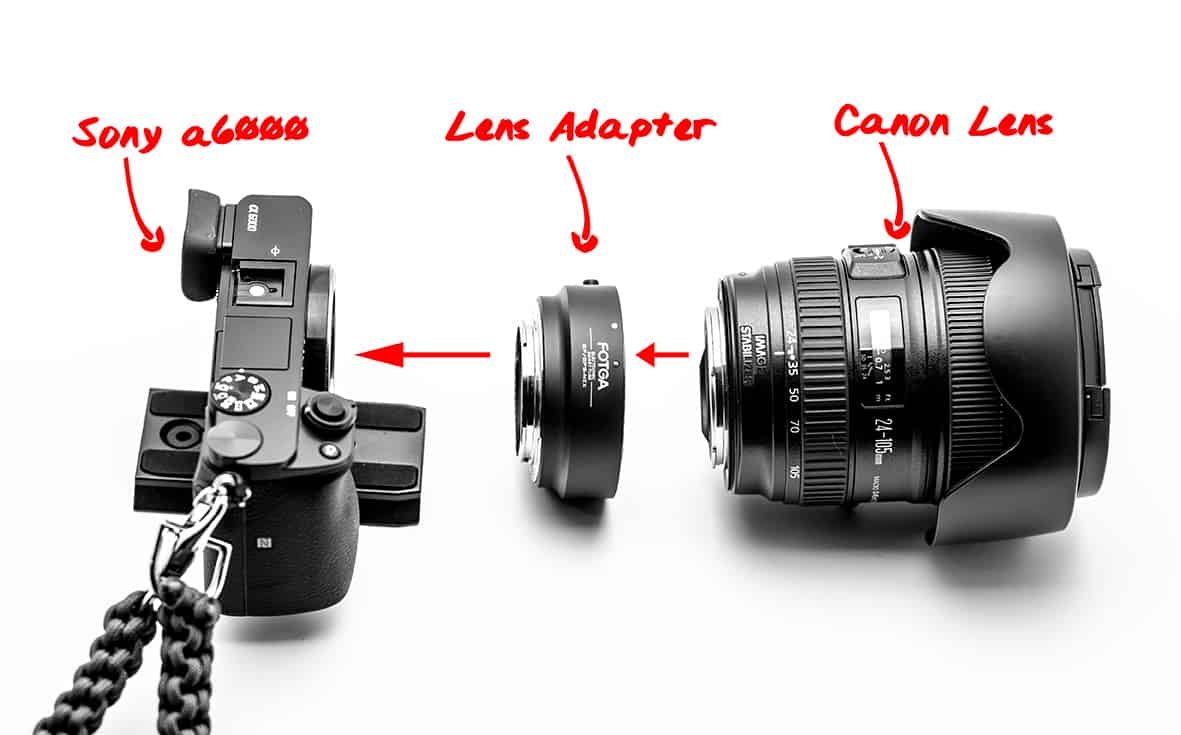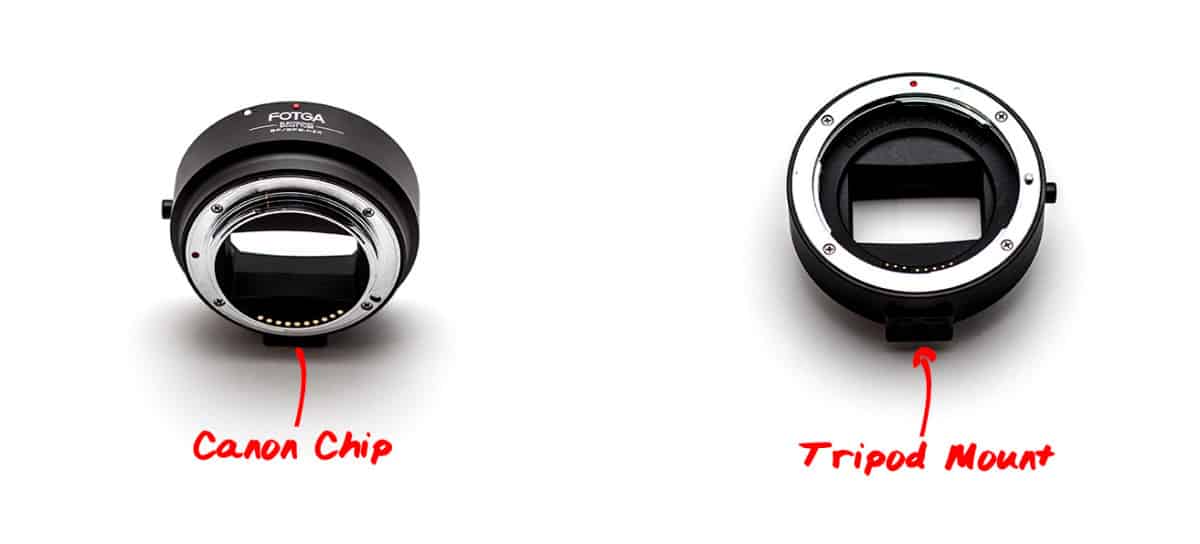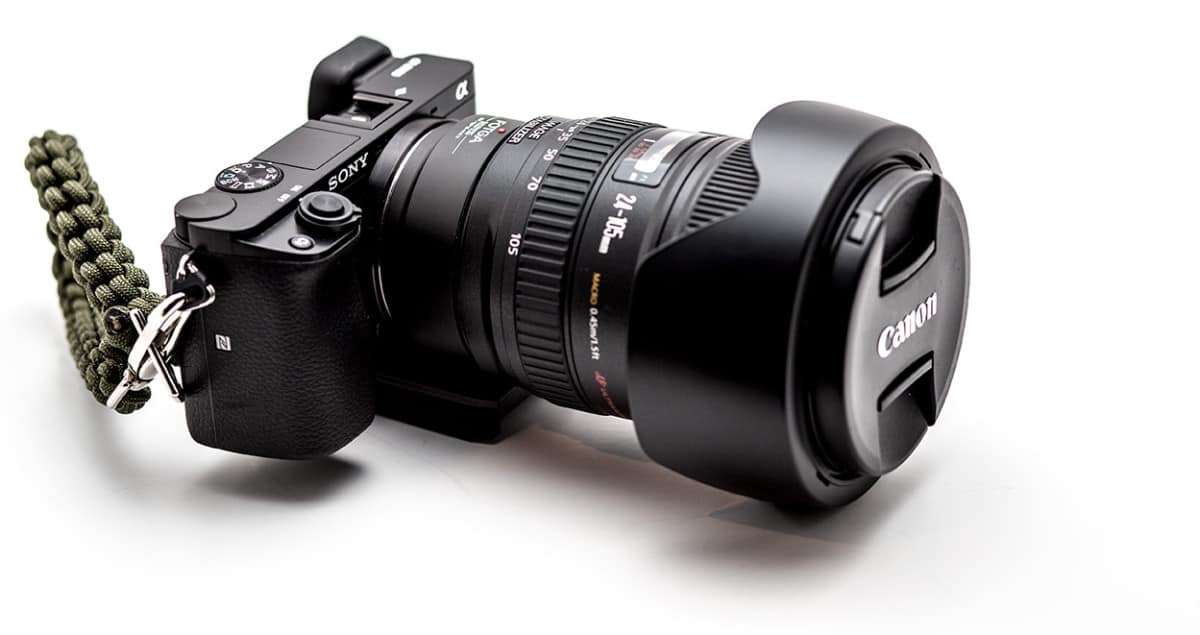A Look at Lens Adapters
These days there are tons of ILC and Mirrorless cameras on the market that are giving DSLRs a run for their money. DSLRs have been the Gold Standard for a very long time and there are hundreds of lenses for each major camera maker. The opposite is true for the mirrorless and ILC cameras. It seems the manufacturers are crushing out these little camera bodies without producing adequate lenses to compare to the DSLRs on the market, case in point, the Sony line-up.
I purchased a Sony a6000 in September and have only picked it up a handful of times. This is not because the camera is incapable of producing great results, it’s very much the opposite actually. It is due to the kit lens that came with it. I will boldly say the 16-50mm powered lens that comes with the a6000 is trash. The images are very soft and the lens itself sounds clunky during operation.
Why not buy another Sony lens?
Well there are only about 20 to choose from for the a6000 and to be honest, I don’t place a lot of trust in Sony to produce a great lens based on the results of the kit lens. I wouldn’t give the Sony a6000 with the kit lens attached to an enemy to use. Okay okay, maybe it isn’t that bad, but my point is my upgrade choices are very slim.
Zeiss makes some very fancy glass for this camera. However, before I dropped $1000 on a lens for my side-arm camera I wanted to make sure the a6000 was capable of great pictures with a good quality lens.
This is where the lens adapter comes in. With a lens adapter you are able to convert the Mirrorless or ILC mount to adapt to the lenses of other camera makers. There are many camera companies making these Lens Adapters, from big names like Metabones to the lesser known ones like Fotga…
What to look for in a Lens Adapter
I did a ton of research on Lens Adapters before I made my purchase. I looked into Metabones and was just about to pull the trigger, but I couldn’t justify the price. The Metabones adapters are known for their quality and ability to use Autofocus and Aperture Control. However, they are very expensive, almost the cost of a decent lens for the Sony.
In the past I have been accused of not being “professional” for my thrifty nature when it comes to gear choices. However, I have diapers to buy and Infant Formula is not cheap! If I can save a buck or 200 here or there for a product that is relatively similar (if not the same exact thing), I am going to! It really comes down to what you plan on using it for, how often you plan on using it, and if the features will benefit you.
So what are you looking for?
- Is the Lens adapter chipped for Autofocus
- Is the lens Adapter chipped for Aperture Control
The latter is the most important, especially for my purposes. If the adapter is not chipped for Aperture Control you have to set the aperture on the Canon camera, remove the lens, and then place it on the Sony camera.
If you want to change the aperture you have to remove it from the Sony camera, place it on the Canon Camera, set the Aperture, remove it from the Canon and replace it on the Sony. This is a ridiculous process and is typically only the case if you buy a very cheap adapter that is not chipped for aperture control.
Autofocusing with a Lens Adapter is possible, however, it will always be slower. Whether you are using the Metabones Adapters or a cheap adapter there will be some reduction in autofocus speed. Being a landscape photographer, I pretty much am tri-pod mounted and am shooting with Live-View in Manual Focus. Autofocus speed is not critical for my purpose and daily use.
Why the Fotga Lens Adapter
Anytime you purchase a no-name brand on Amazon you are in for a crap shoot. I learned my lesson many times from buying cheap crap on Amazon. However, this Adapter seemed to be receiving enough good reviews that I thought I’d give it a chance. I purchased it on Amazon for $63 compared to many of its competitors that come in at $3-400.
The Good:
- It works exactly as advertised. I did not have any problems with the connection to the a6000 and every lens I tested with it was fully compatible.
| Lenses Tested |
| Canon 50mm – 1.4 |
| Canon 85mm – 1.8 |
| Canon 24-105mm L USM |
| Canon 17-40mm L USM |
| Canon 70-300mm f4.5-5.6 |
| Rokinon 14mm f/2.8 |
- I was able to control the Aperture without any problems.
- Infinity Focus was achieved on field tests with the Rokinon 14mm and 17-40mm lenses.
- I am now able to use all of my beautiful L series glass on the a6000!
The Bad:
- Autofocus was horrible, at best, in low light. While in my office lighting, I turned the focus dial way out of focus and tried to autofocus, the motor moved for about 3 seconds and never focused on anything. Outdoors it fared a little better, but I would not rely on Autofocus while using this lens adapter.
- It does have a slight movement in the connection to the a6000. I noticed when I was focusing the 70-300mm lens at 300 that when I removed my hand from the lens it fell about a 1/16 of an inch. In terms of wide angle lenses this is not critical and will not be noticed, but with a long zoom you will see difference in the composition.
The Bottom Line:
If you are a Landscape photographer and autofocus speed is not critical for you, this adapter is perfect. It does exactly what it is supposed to do and does it for a fraction of the cost of many other lens adapters. We will see how it fares in the long run with more extensive testing.
Stay Tuned! On Friday I will be showing the Canon 6D vs the a6000 in a field test on ISO, Crop Factor, HDR processing, and Image Quality all using the same lenses.












Great review Blake! Im about to bite the bullet and pick up this killer camera too. My question is do you think its worth the $200 bucks to get the body w/ the kit lens to take advantage of the crazy autofocus abilities of the camera even though the lens is “trash” or do you think its more advantageous to spend the $500 on the body, then drop another $500-$1000 on a good sony/sigma/tamron (whatever) e mount lens..
Boiled down, gun to your hard drive, do you spend $700 and get the kit lens, or spend $1300 to get the body, mid-range lens, fotga adapter – assuming you are wanting to utilize the AF speeds of the camera. Is the kit lens crappy enough to spend another $600 to avoid it?
I cant justify just buying the camera to buy it, i want to use that awesome focus tracking, which wouldnt work w/ the Fotga/Canon 24-70 for example.
Thanks Tyler.
You know, if I could do it all over again I would have bought the body and spent the extra on a decent lens to, like you mentioned, take advantage of the focus tracking capabilities in this camera. The a6000 has sat on my shelf for nearly 4 months due to the lack of lenses and the lack of desire to use the kit lens with it. At 16mm the kit lens has horrible vignettes on every shot that don’t improve until about the 20-22mm range. It is pretty slow to focus, and is just clunky. It is a powered lens, so when you turn the camera on it comes “out of its shell to play” so to speak.
This is my personal stance, I would much rather have bought the body by itself and looked at the cost of the kit lens as more of a discount on a higher end lens. I read the reviews on the kit lens and didn’t want to believe them. If you have the extra money for the higher end lens and you know you are going to buy one later anyway, it may be worth it to forgo the kit lens and buy the higher end one. I know no one wants to hear that, but it could have saved me some money in the long run.
However, on the flip side. If you don’t want to fork up the extra cash for the lens and can deal with all of the downsides of the kit, then go with it!
Tyler, I own the NEX-6, which is the forerunner of A6000. It also came with the same kit lens. I spent almost a year frustrated at the quality of my photos, especially noise, that I consistently got from that lens. I finally bit the bullet and bought the Sony SL18105, 18-105 mm lens. It has not been off my camera since I purchased it last June. After about 5000 clicks, even the bad shots with this lens are better that some of the better shots I made with the kit lens. That said, I have a 16-50 Sony lens for sale. Now my concern is whether to buy the A6000 and remain with a crop sensor, or go to the A7 II.
The 16-50mm kit lens that came with the Sony a6000 I bought suddenly stopped working after only a few months. I had been getting great photos with it, then out of nowhere, I got an error message, “lens not recognized”. He’s correct. It’s trash. I too ended up buying an adapter instead of buying another one of the kit lenses. I really really love the camera though.
You have sold me Blake. About to buy the A6000 and now i can use my large collection of Nikon lenses
It is pretty sweet. I am putting together a video for the comparison of the two cameras for Friday. I am impressed with this little gal, Sonya is her name. She is making Cameran jealous.
Thanks for this blog.
I was advised that the kit lens that came with my NEX6 was ok, just ok. The salesman recommended the Tamron 16-300. It is smaller than the Sony lens and cheaper too. I am happy with it and use it exclusively. I still have my Canon 7D, I am interested in the adapters. I have two Canon kit lenses (17-85 and 75-200) that I am very happy with. And, best of all, my sister-in-law has a few very nice L lenses. I have little pride and will borrow them as I am able.
I bought the a6000 the last part of 2014, and like Blake it has set on my shelf because the 16-50mm pancake kit lens is soft. My daughter doesn’t notice it, as she takes jpg snap shot pics of the kids and post them on Facebook. I have read this camera is very good at processing jpgs and is what the lens is built for For a serious photographer who shots RAW and processes their own pictures, you notice the difference.
I have read the Zeiss e-mount lens for this camera is made by Sony, thus it is a Sony lens. Having finally decided mirrorless cameras are the future, I’m probably going to bite the bullet and buy the Sony 10-18mm lens which cost around $850. Reviews are good. The reason I purchased the a6000 was because it was lite weight, compact and easy to tote around. The e-mount lenses small, lite weight and easy to pop on and off. Compact enough to put in a big pocket. I’ve been happy with the RAW images when using the long range zoom lens that came with it.
To me buying an adapter and connecting a big, heavy Canon or Nikon lens to this tiny lite weight camera is defeating the purpose of this camera in the first place.
That 16-50 lens is terrible! However, you are right on the large lenses defeating the purpose of a compact camera. I really wanted to see how powerful this sensor was though and the only way to do it without the Canon/Sony glass bias was to use the adapter and cut out the variable of glass. When this camera has Canon glass on it the sensor just shines! Too bad it is a crop sensor. I really want the a7r now. I think I am going to wait to see what Canon produces though.
I had a useful experience the opposite way round. In the old film days, I had used a Pentax MX film camera and had acquired a Tamron SP 90 portrait macro lens for it about 40 years ago. Recently I had purchased a Panasonic G2 micro four thirds digital mirrorless camera. So I purchased am inexpensive Fotodiox manual adaptor to connect the old macro lens to the digital camera and have had some fabulous results. I would have had to use manual focussing and Aperture priority settings anyway for macro work so the excellent manual adaptor was fine for my needs and works brilliantly.
That is pretty cool. I noticed with Macro I only Manual Focus, if I even do that. Most times I am the bellows, so to speak, and focus by moving myself back and forth. I have some old Canon lenses laying around that I should try that with. That would be interesting. Thanks for the feedback and tips there.
I, too, have been looking for this type of adapter after purchasing Sony A7R. After reading reviews of various available adapters and seeing that Serge Ramelli uses it, I’ve settled on Commlite adapter. So far, I was only able to evaluate it briefly with my Canon 17-40 and 70-200 L lenses and autofocus and aperture controls seem to work fine. I also was concerned using heavy Canon lenses with this small and light camera, but have noticed that Sony 70-200 F/4 FE lens is actually slightly heavier than the same Canon lens. I was considering a full switch from my Canon 5D Mark iii to Sony A7R until I discovered that Sony is not weatherproof and that people had moisture issues with it.
BTW, I found your tutorials very informative. Thanks.
You are welcome! Thanks a ton for stopping by and the feedback on that adapter. I was between the Commlite and Fotga. I think they are probably very similar in nature and just comes down to personal preference. After playing with it more I have found the AF to be faster on some lenses than others. It is odd, I still don’t rely on AF much anymore to worry about it though.
Hey blake, thanks for your review it was very help full even though I have a question.
Does the stabilization works with this adapter on L series lenses?
Thanks! I do believe it does as the stabilization is in the lens and not controlled from the camera body. As long as the Stabilization is switched to on on the lens it should work just fine.
Have you heard anything re the FOTGA on a A5000 I have one and it does nothing the F flashes and there is no focusing at all. I contacted FOTGA and they say it should work… but NOT I have tried 6 different Canon lenses and nota ..
TIA